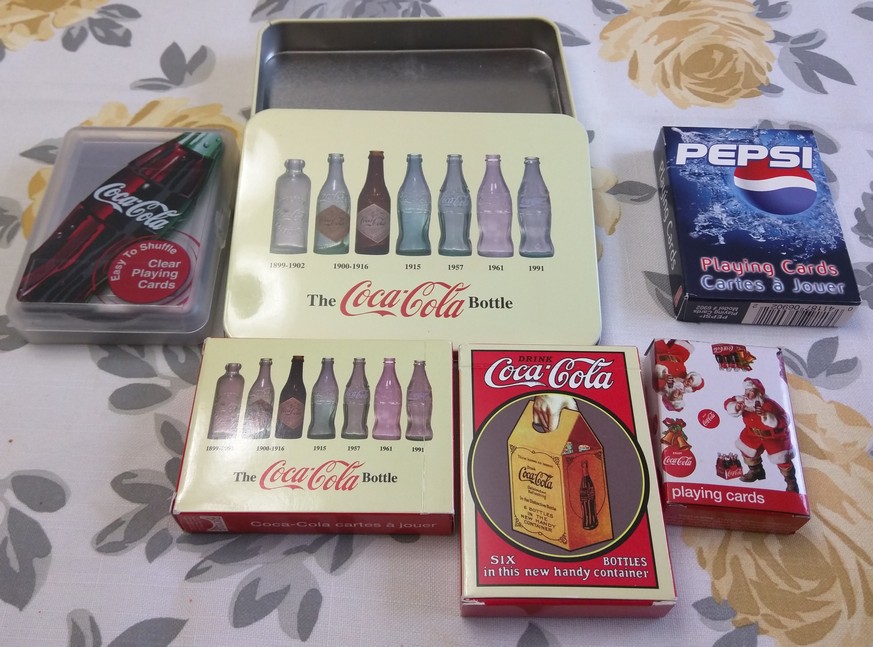
Few corporate rivalries have such a storied history as Coca-Cola and PepsiCo. What ostensibly started as a competition over the best soft drink in the land, has expanded into so many different markets that the two now own not just drink and snack manufacturing, but entire media empires. Licenses and product placement for Coke and Pepsi products spilled into movies, television shows (and ultra-high-budget Super Bowl ads), video games...and, you guessed it, decks of playing cards.
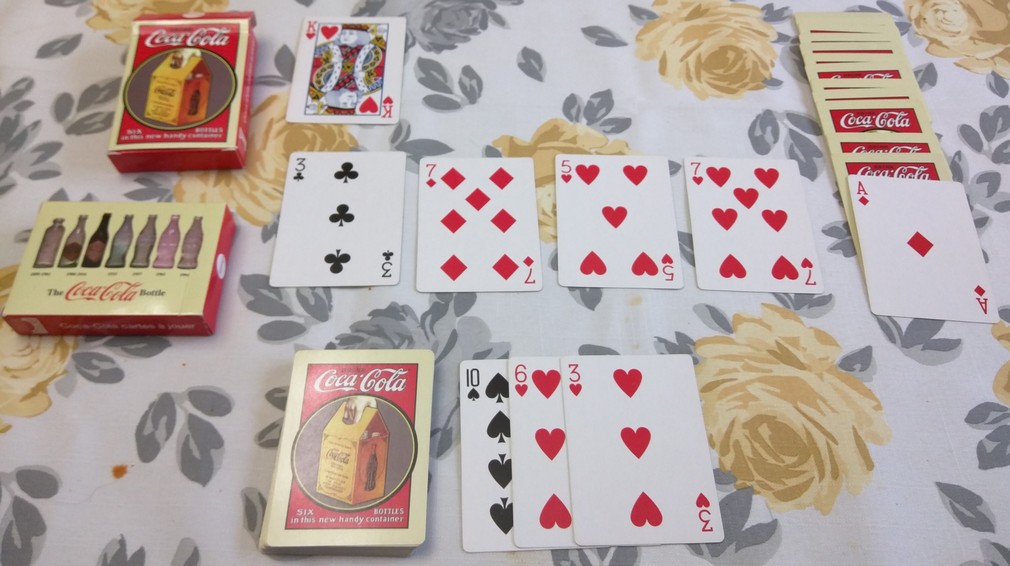
One deck of "six-pack" Coke cards running Canfield. The other deck from the tin is sitting unopened on the left.
Among the first cards I ever decided to buy for the sake of collecting was a special tin containing two classic-style Coke back designs, priced at an affordable $5 at my local Bi-Mart store. Admittedly, these aren't really anything special; the fronts are standard Bicycle prints, and only the backs are different, with one containing a vintage advertising flyer, and the other bearing a timeline of Coke bottles. Even the Ace of Spades and Jokers are just the typical Bicycle design.
But it being so basic is not necessarily a bad thing; the cards are easy to handle, flexible, as easy to shuffle and deal as any other plastic-coated-paper deck on the market, and they've stood up to a fair amount of abuse in the seven years I've owned them. The collectible tin is a nice touch, but of the two decks, I'm not likely to use the "bottle timeline" deck, since its design only looks correct when it's sideways. (I wonder why landscape-oriented cards aren't more common?)
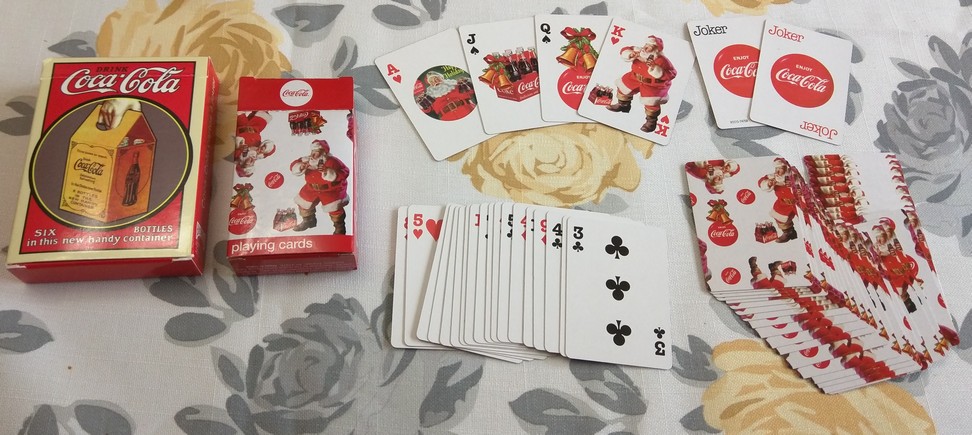
Coca-Cola's famous Santa artwork graces this next deck.
Coca-Cola are well known for their recurring Santa Claus paintings (so famous, in fact, that there is a popular myth that Coca-Cola invented the modern Santa, even though that's not true at all). Santa appears, in all his red-nosed glory, on everything from cans, bottles, and 12-pack boxes, to posters, jigsaw puzzles, and smaller-than-average decks of cards.
The Santa deck is a little bit more elaborate than the two decks from the collector's tin. The rank numbers are now printed in a more Coke-ish font, and the face cards bear images of Santa, bells, Coke logos, and 6-pack crates of the popular Coke bottle. They measure very slightly smaller than a poker-sized deck, but larger than the really tiny ones I looked at a couple weeks ago. These suffer from the same playability problems, unfortunately, but at least the construction quality of these cards is somewhat better, as once again, these are manufactured by the US Playing Card Company, under the Bicycle brand, using the same process of plastic coated paper.
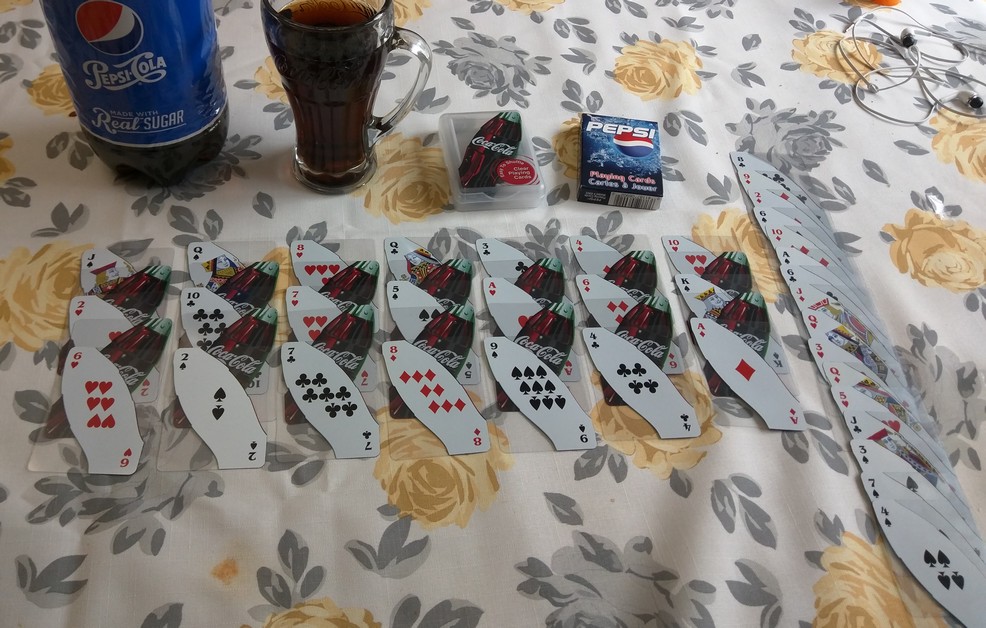
This might just be the most frustrating photo I've ever taken, if you're a Coke devotee. The game I'm running in this photo is Stonewall, though in retrospect I think I dealt it wrong.
The most interesting deck of this bunch has got to be this deck of all-plastic transparent cards bearing a large Coca-Cola bottle design. Purchased for a mere $7 at a hole-in-the-wall tabletop game store in downtown Portland, these cards are durable, flexible, and ridiculously fun to play with. I bought them mainly for the sake of curiosity. I was not sure how well a see-through deck would play, especially if the designs had such large holes in them. It turns out, they play just as well as any other deck, as the Coke bottle is tilted in such a way that the rank and suit are still in the very corners of the cards. You don't have to pay much attention to how the cards are stacked, since they're still the same size and shape as a regular poker deck, and the actual designs are totally opaque, so you can't cheat at multiplayer games using this deck. They even look really cool when running a game of Stonewall.
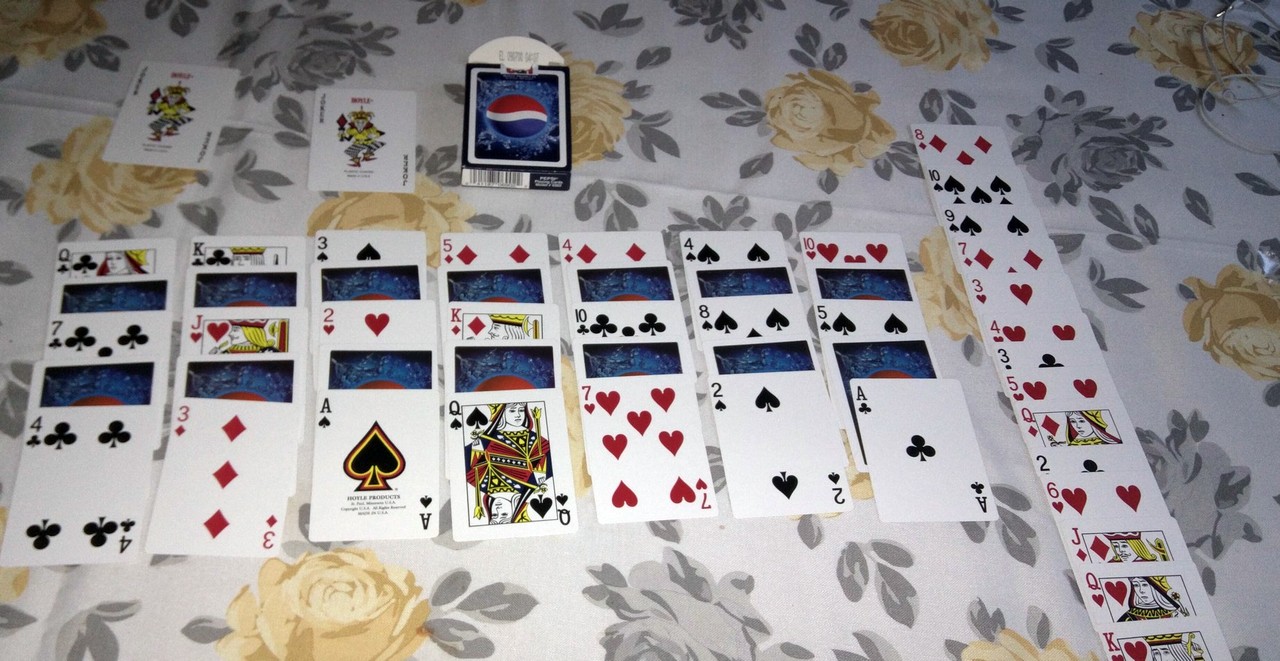
And finally, the other side: a hand of Stonewall takes on The Pepsi Challenge. I think I still dealt it the wrong way - it's 6 columns of 6 cards, not 7 columns of 5. D'oh!
What surprised me about doing the research for this article is that Coca-Cola clearly has a much larger grasp on the licensed playing card market than Pepsi does. I've found Coke decks just lying around various shops, with what seems like a new and interesting design coming every year or so, and yet I've never seen a Pepsi deck in a store. I eventually had to order an older deck online. But this rabbit hole goes deeper into a different sort of market war: Bicycle versus Hoyle. Not so much a war anymore, though, as Hoyle Products is now under the same banner as Bicycle: the United States Playing Card Company. Hoyle, and its distinctive outlined Ace of Spades design, were responsible for the manufacture of this deck of Pepsi cards that I had to order online from Amazon. It was slightly expensive, but when you're covering the Cola Wars from a card player's perspective, money becomes somewhat less of an object.

"Less of an object," not "no object." Sheesh.
There is only so much I can really say about decks of cards when they're just regular designs like this (and the collector's tin above). In both cases, the cards themselves are only branded on their backsides, with no real changes to the front. One could stick Pepsi logos on any old deck and achieve the same effect. I mean, I suppose I shouldn't be expecting Pepsiman to be the King of Spades or anything like that, but there is so much room for them to draw the rank numbers in the Pepsi font, or festoon the aces with the logo, or replace the Kings' swords with Pepsi cans. Really just go to town with the branding. Yet they didn't. And that, combined with their relative lack of saturation in the playing card market, is why I ultimately prefer the Coke decks. Yet I remain undecided in the actual Cola Wars...though maybe that's because I always preferred root beer.